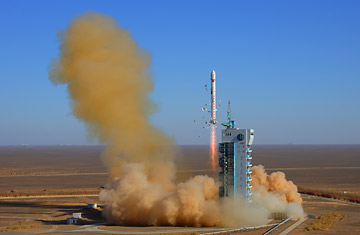
A Chinese satellite is launched in 2008
(2 of 2)
Still, the trend seems set. "In 2002, for reasons of both national security and commercial competitiveness, European governments encouraged companies to develop technologies that do not rely as heavily on American suppliers bound to U.S. government oversight," the source says. The result: operators such as Eutelsat can now buy satellites without U.S. content and legally turn to China to launch them.
And why wouldn't they? The price of launching a satellite in the U.S., Europe or Russia runs between $80 million and $100 million. China, says Bertrand Laport, an equities analyst and technology specialist for Fortis in Paris, can put your satellite into orbit for around half that. "The other big advantage China has is that launch schedules of Western groups are typically booked for one to two years in advance, while China's schedule remains relatively flexible," says Laport. "That additional capacity, relatively good technology quality and a reliable launch record will make China an option companies will probably consider more as time goes by."
The growing competition is already hurting U.S. satellite makers. It's not just the launch business — the money spent on launches accounts for less than 3% of the $123 billion satellite industry overall — but the much more lucrative manufacturing contracts. U.S. manufacturers complain that since the export restrictions were introduced 11 years ago, the global market share controlled by U.S. companies has plunged from 80% to 41%.
Critics of the export restrictions argue that U.S. firms are suffering for nothing — because the ban has grown increasingly ineffectual. They want the government to revise ITAR and make it easier for U.S. companies to compete. "If non-American groups are constructing satellites for clients ready to turn to China for cheaper launches, China will be handling the same technology despite a U.S. ban," Laport says. "They'd be better off changing the rules to apply only to truly sensitive military and defense technologies."
Not everyone agrees. Responding to reports of the Eutelsat deal late last month, Republican Congressman Dana Rohrabacher, who sits on the Science and Technology Committee, vowed that "rogue nations" will continue to be "barred from receiving our high-tech systems." Chief among those countries, he said, "is the People's Republic of China." Rohrabacher also warned that the U.S. is prepared to slap down any non-U.S. satellite companies who sidestep ITAR and do business with Beijing, even if they don't break the ban. "Eutelsat sells tens of millions of dollars worth of satellite services to the U.S. Government through [Defense Information Systems Agency] contracts," Rohrabacher said. "Clearly, this is the beginning of a game of chicken between Eutelsat and the Obama Administration."
But it's a game Washington could just as easily lose as win. As Foust notes, plenty of U.S. companies and government agencies rely on foreign commercial-satellite operators like Eutelsat for their communications systems — including 85% of those the Pentagon maintains. "There's more to lose than to gain by trying to turn a low-profile policy issue in Congress into a huge fight," Foust says. "It's wiser to opt for policy reform that will allow everyone to work more efficiently, but still protect strategic interests."
And just in case politics gets in the way, Beijing is hedging its bets on Hainan Island by building a $1 billion space-science theme park and launch-viewing area for 300,000 people right outside the new space facilities. That way, China can make a few bucks off tourists even if satellite clients stay away.
